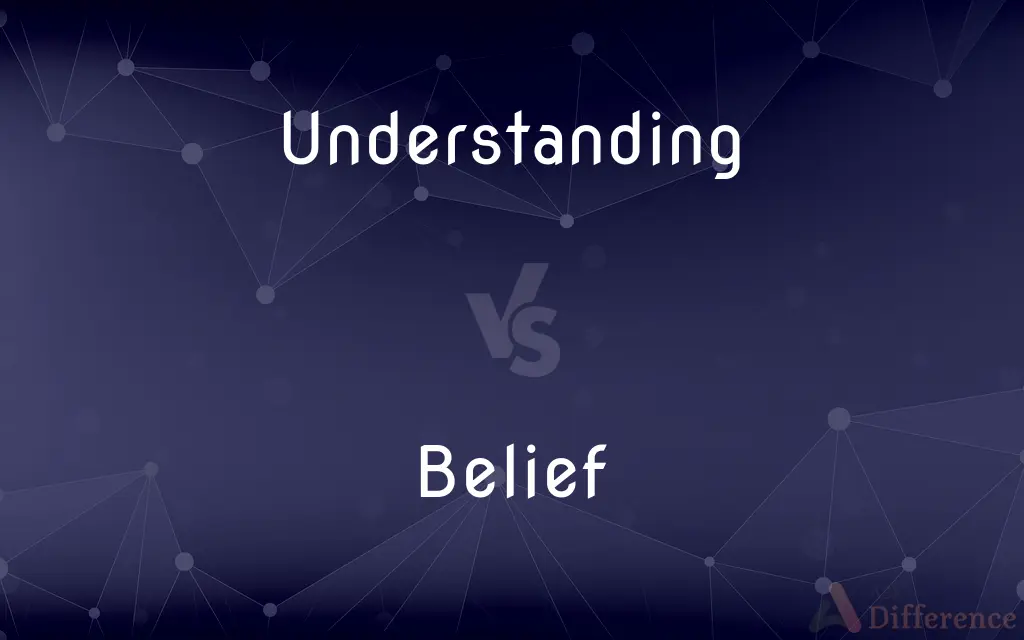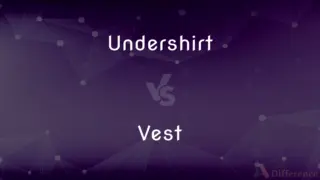Understanding vs. Belief — What's the Difference?
Edited by Tayyaba Rehman — By Maham Liaqat — Updated on March 27, 2024
Understanding is grasping the meaning or nature of something, often through learning and reasoning, while belief is accepting something as true, often without proof or based on faith.

Difference Between Understanding and Belief
Table of Contents
ADVERTISEMENT
Key Differences
Understanding involves comprehending the how and why of something, emphasizing knowledge and insight gained through learning and reasoning. It requires cognitive engagement and the ability to integrate new information with existing knowledge. On the other hand, belief is the acceptance that something is true, which may not necessarily rely on empirical evidence or logical reasoning. Beliefs can be influenced by culture, faith, or personal experiences, and do not always require the same level of cognitive proof as understanding.
While understanding seeks to explain and rationalize, providing a clear basis for why things are the way they are, belief is more subjective, often rooted in personal conviction, faith, or trust, without the need for empirical evidence. Understanding is dynamic and can evolve with new information or insights, whereas beliefs can be more static, potentially persisting even in the face of contradictory evidence.
Understanding is often a goal in educational and learning contexts, where the emphasis is on developing a deep comprehension of subjects through study and critical thinking. In contrast, belief is fundamental to personal and cultural identity, shaping values, perceptions, and actions, often beyond the realm of formal learning.
The process of reaching understanding typically involves questioning, analyzing, and synthesizing information to form a coherent view of the subject matter. Belief, however, may arise from tradition, authority, or personal experience, and does not necessarily undergo the same rigorous cognitive processes.
Understanding and belief, while distinct, can intersect and influence each other. A deep understanding of a subject can shape or reinforce beliefs, and conversely, personal beliefs can guide the pursuit of understanding in particular areas or influence how information is interpreted.
ADVERTISEMENT
Comparison Chart
Definition
Grasping the meaning or nature of something.
Accepting something as true, often without proof.
Basis
Learning, reasoning, and evidence.
Faith, personal conviction, or culture.
Objective
To comprehend and rationalize.
To hold a conviction or trust.
Nature
Dynamic and can evolve.
May be static and resistant to change.
Role in Learning
Central, focuses on gaining insight.
Influences values and perspectives.
Compare with Definitions
Understanding
Insight gained through learning.
The course gave him a better understanding of mathematical concepts.
Belief
Acceptance of something as true without proof.
His belief in the startup's success was unwavering.
Understanding
Grasping the meaning or nature of something through reasoning.
His understanding of physics was evident in his explanations.
Belief
Conviction or faith in particular doctrines.
Her beliefs were shaped by her cultural background.
Understanding
Comprehension based on study and reasoning.
Her deep understanding of history enriched her lectures.
Belief
Trust or confidence in a person or concept.
Their belief in the team's ability led to success.
Understanding
Cognitive grasp of subjects or situations.
They reached an understanding of each other's viewpoints.
Belief
Acceptance of a statement or concept as true.
The belief that hard work pays off is widespread.
Understanding
Ability to apply knowledge effectively.
Understanding the problem is the first step toward solving it.
Belief
An opinion or conviction held as true.
The community's beliefs about the forest were rooted in tradition.
Understanding
Understanding is a psychological process related to an abstract or physical object, such as a person, situation, or message whereby one is able to use concepts to model that object. Understanding is a relation between the knower and an object of understanding.
Belief
The mental act, condition, or habit of placing trust or confidence in another
My belief in you is as strong as ever.
Understanding
The ability by which one understands; intelligence
Concepts that are beyond the understanding of a child.
Belief
A belief is an attitude that something is the case, or that some proposition about the world is true. In epistemology, philosophers use the term "belief" to refer to attitudes about the world which can be either true or false.
Understanding
The quality or condition of one who understands; comprehension
Do you have much understanding of calculus?.
Belief
Mental acceptance of and conviction in the truth, actuality, or validity of something
His explanation of what happened defies belief.
Understanding
Individual or specified judgment or outlook; opinion
In my understanding, this is a good plan.
Belief
Something believed or accepted as true, especially a particular tenet or a body of tenets accepted by a group of persons.
Understanding
A usually implicit agreement between two or more people or groups
An understanding between neighbors over late-night noise.
Belief
Mental acceptance of a claim as true.
It's my belief that the thief is somebody known to us.
Understanding
A disposition to appreciate or share the feelings and thoughts of others; sympathy
Can't you show some understanding for the poor child?.
Belief
Faith or trust in the reality of something; often based upon one's own reasoning, trust in a claim, desire of actuality, and/or evidence considered.
My belief is that there is a bear in the woods. Bill said he saw one.
Based on this data, it is our belief that X does not occur.
Understanding
Characterized by or having good sense or compassion
An understanding teacher.
Belief
(countable) Something believed.
The ancient people have a belief in many deities.
Understanding
The act of one that understands or comprehends; comprehension; knowledge; discernment.
Belief
(uncountable) The quality or state of believing.
My belief that it will rain tomorrow is strong.
Understanding
(countable) Reason or intelligence, ability to grasp the full meaning of knowledge, ability to infer.
Belief
(uncountable) Religious faith.
She often said it was her belief that carried her through the hard times.
Understanding
(countable) Opinion, judgement or outlook.
According to my understanding, the situation is quite perilous. I wonder if you see it this way, too.
Belief
(in the plural) One's religious or moral convictions.
I can't do that. It's against my beliefs.
Understanding
(countable) An agreement of minds; harmony; something mutually understood or agreed upon.
Belief
Assent to a proposition or affirmation, or the acceptance of a fact, opinion, or assertion as real or true, without immediate personal knowledge; reliance upon word or testimony; partial or full assurance without positive knowledge or absolute certainty; persuasion; conviction; confidence; as, belief of a witness; the belief of our senses.
Belief admits of all degrees, from the slightest suspicion to the fullest assurance.
Understanding
An informal contract; mutual agreement.
I thought we had an understanding - you do the dishes, and I throw the trash.
Belief
A persuasion of the truths of religion; faith.
No man can attain [to] belief by the bare contemplation of heaven and earth.
Understanding
A reconciliation of differences.
The parties of the negotiation have managed to come to an understanding.
Belief
The thing believed; the object of belief.
Superstitious prophecies are not only the belief of fools, but the talk sometimes of wise men.
Understanding
(uncountable) Sympathy.
He showed much understanding for my problems when he heard about my past.
Belief
A tenet, or the body of tenets, held by the advocates of any class of views; doctrine; creed.
In the heat of persecution to which Christian belief was subject upon its first promulgation.
Understanding
Showing compassion, tolerance, and forbearance.
Belief
Any cognitive content held as true
Understanding
(dated) Knowing; skilful.
Belief
A vague idea in which some confidence is placed;
His impression of her was favorable
What are your feelings about the crisis?
It strengthened my belief in his sincerity
I had a feeling that she was lying
Understanding
Present participle of understand
Understanding
Knowing; intelligent; skillful; as, he is an understanding man.
Understanding
The act of one who understands a thing, in any sense of the verb; knowledge; discernment; comprehension; interpretation; explanation.
Understanding
An agreement of opinion or feeling; adjustment of differences; harmony; anything mutually understood or agreed upon; as, to come to an understanding with another.
He hoped the loyalty of his subjects would concur with him in the preserving of a good understanding between him and his people.
Understanding
The power to understand; the intellectual faculty; the intelligence; the rational powers collectively conceived an designated; the higher capacities of the intellect; the power to distinguish truth from falsehood, and to adapt means to ends.
But there is a spirit in man; and the inspiration of the Almighty giveth them understanding.
The power of perception is that which we call the understanding. Perception, which we make the act of the understanding, is of three sorts: 1. The perception of ideas in our mind; 2. The perception of the signification of signs; 3. The perception of the connection or repugnancy, agreement or disagreement, that there is between any of our ideas. All these are attributed to the understanding, or perceptive power, though it be the two latter only that use allows us to say we understand.
In its wider acceptation, understanding is the entire power of perceiving an conceiving, exclusive of the sensibility: the power of dealing with the impressions of sense, and composing them into wholes, according to a law of unity; and in its most comprehensive meaning it includes even simple apprehension.
Understanding
Specifically, the discursive faculty; the faculty of knowing by the medium or use of general conceptions or relations. In this sense it is contrasted with, and distinguished from, the reason.
I use the term understanding, not for the noetic faculty, intellect proper, or place of principles, but for the dianoetic or discursive faculty in its widest signification, for the faculty of relations or comparisons; and thus in the meaning in which "verstand" is now employed by the Germans.
Understanding
The cognitive condition of someone who understands;
He has virtually no understanding of social cause and effect
Understanding
The statement (oral or written) of an exchange of promises;
They had an agreement that they would not interfere in each other's business
There was an understanding between management and the workers
Understanding
An inclination to support or be loyal to or to agree with an opinion;
His sympathies were always with the underdog
I knew I could count on his understanding
Understanding
The capacity for rational thought or inference or discrimination;
We are told that man is endowed with reason and capable of distinguishing good from evil
Understanding
Characterized by understanding based on comprehension and discernment and empathy;
An understanding friend
Common Curiosities
How do understanding and belief differ?
Understanding is based on evidence and reasoning, while belief is more about acceptance without the need for empirical proof.
What is understanding?
Understanding is comprehending the meaning or nature of something, typically through learning and reasoning.
Can beliefs change with new understanding?
While beliefs can be more resistant to change, they can evolve with new insights or understanding.
Is understanding more valuable than belief?
The value of understanding versus belief depends on the context; both play important roles in shaping perspectives and knowledge.
What is belief?
Belief is the acceptance of something as true, often based on faith rather than empirical evidence.
How do beliefs form?
Beliefs can form from cultural, educational, or personal experiences, and do not always require logical proof.
What role does evidence play in understanding and belief?
Evidence is central to understanding but may not be as crucial for belief, which can be based on faith or trust.
Is it possible to understand something without believing in it?
Yes, it's possible to comprehend how something works or its significance without necessarily believing in its value or truth.
How do personal experiences affect understanding and belief?
Personal experiences can profoundly impact both understanding and belief, shaping our perceptions and convictions.
Can understanding influence belief?
Yes, a deeper understanding of a subject can influence or reinforce one’s beliefs.
Why is it important to differentiate between understanding and belief?
Differentiating helps in recognizing the basis of our knowledge and convictions, guiding clearer thinking and communication.
Can someone believe in something they don't understand?
Yes, people often believe in concepts or ideas that they do not fully understand, especially in matters of faith.
How do culture and education influence understanding and belief?
Culture and education shape the frameworks within which we develop our understandings and beliefs, influencing how we perceive and interpret the world.
Can understanding and belief coexist on the same topic?
Yes, it's common for individuals to both understand and hold beliefs about a particular topic, often influencing each other.
How do understanding and belief impact decision-making?
Both understanding and belief guide decision-making, with understanding often informing logical decisions and beliefs shaping decisions based on values or faith.
Share Your Discovery

Previous Comparison
Yonic vs. Phallic
Next Comparison
Undershirt vs. VestAuthor Spotlight
Written by
Maham LiaqatEdited by
Tayyaba RehmanTayyaba Rehman is a distinguished writer, currently serving as a primary contributor to askdifference.com. As a researcher in semantics and etymology, Tayyaba's passion for the complexity of languages and their distinctions has found a perfect home on the platform. Tayyaba delves into the intricacies of language, distinguishing between commonly confused words and phrases, thereby providing clarity for readers worldwide.
















































